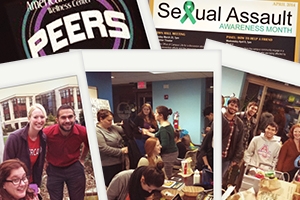On Campus
PEERS Take a Stand on Sexual Assault Prevention

Standing
Speaking at the front of a room full of young men last fall, Kirsten Franzen was anxious. “I was really nervous,” Franzen recalled. “It was for a fraternity, and there are a lot of stereotypes around fraternities. I didn’t know what it was going to be like.”
Franzen, a junior in the School of International Service, was conducting her first workshop on sexual assault, relationship violence, and stalking. As a member of Peer Educators for the Elimination of Relationship & Sexual Violence—or PEERS—she’s dedicated to raising awareness around these issues and promoting an end to them.
Daniel Rappaport, AU’s sexual assault prevention coordinator, heads the 15-member group through the Wellness Center. Under his weekly instruction, Franzen and the others earn academic credits while learning how to facilitate workshops and affect change on campus.
To him, though necessary, sexual assault often isn’t an easy topic to approach. He lauds Franzen for standing up. “It’s such an admirable and courageous thing for students to devote their time and energy, for at least two semesters, to making this issue a significant part of their life with the intention to help others,” he said.
Educational Push
PEERS, now in its third year on campus, isn’t the only program at AU addressing sexual assault education. In fact, according to associate dean of students Michelle Espinosa, 96% of incoming AU freshmen experience education on the topic either at Eagle Summit summer orientations or the online Haven program.
But, as chair of the university’s faculty and staff Sexual Assault Working Group, Espinosa wants to build upon that figure. “It’s a very strong number of students that have participated. What we’re really interested in targeting now is the ongoing education,” she said. “What are we doing to back that up throughout the academic year and throughout all four years that students are here?”
Part of that expanded education and attention has come through Rappaport himself. His position began as part-time in 2010; now he serves students as a confidential victim advocate and prevention educator on a full-time basis.
He believes the changes send a message about the university. “It shows a dramatic and significant improvement in not only trying to prevent sexual violence, dating violence, and stalking,” he said, “but ensuring that students have a confidential resource who specifically works with those issues, ensuring that students are receiving the care from the university that victims of those crimes deserve.”
Throughout April’s National Sexual Assault Awareness Month, Rappaport and scores of AU student groups, offices, and departments are hosting events across campus to keep a spotlight on the issue, which disproportionately affects college students.
A Safe Space
Franzen will host a number of workshops for fraternities, sororities, and residence halls this month. And this time, she’s looking forward to it.
Her first nerve-riddled presentation for the fraternity? “It was great. The guys were really active and really well versed in the issues,” she explained. “It was just a really positive experience for me. Ever since then, I’ve just been like, ‘Yeah! Workshops!’”
The rest of PEERS echo her enthusiasm. After all passing the competitive application process to join and completing fall training, the group’s efforts landed them an invite to present their approach at a regional conference.
Espinosa’s not surprised. Aside from the group, she sees the student culture on campus as one that takes issues like this one head on. “It speaks to how our students recognize the importance of this issue for themselves and their peers,” she said, “and I think it speaks to the university’s leadership appreciating how important this issue is to the safety of our students and their academic success.”
With the nerves of her first workshop behind her, Franzen anticipates a lifetime beyond campus of making this issue central to her personal life. Other PEERS members plan to pursue law degrees and advocacy work, but she views the skills she’s gained from the group as valuable, no matter what the career.
“My goal, personally, is to incorporate this into my everyday life and make sure that people around me feel like I’m a safe space and confidential resource for them to talk to, just to carry that with me wherever I go,” she said.
Check out AU’s calendar of events for Sexual Assault Awareness Month.

